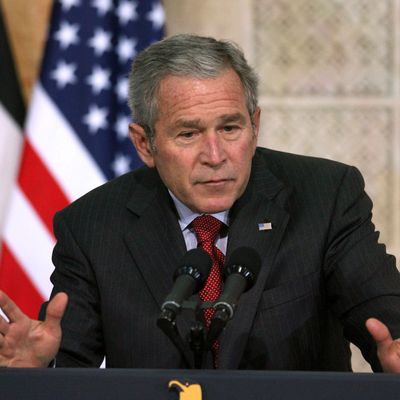
Pretty much everybody in American politics now agrees that the Iraq War was not a great idea. The source of disagreement has moved, instead, to a different question: Was it a failure, or a crime? Republicans insist the Bush administration was merely the victim of bad intelligence. “I still say it was not a mistake,” says Marco Rubio, “because the president was presented with intelligence that said Iraq had weapons of mass destruction.”
Liberal critics reject the honest-mistake explanation. “The Iraq war wasn’t an innocent mistake, a venture undertaken on the basis of intelligence that turned out to be wrong,” replies Paul Krugman, “America invaded Iraq because the Bush administration wanted a war.” And the liberal critics are correct that the war was not merely an honest mistake. But they have framed their indictment of the Bush administration’s intelligence manipulation in such a way as to help it, and its defenders, evade the truth.
It is true that western intelligence agencies badly overestimated Iraq’s weapons capability before the invasion. The Clinton administration, France, Hans Blix, among other sources, all suspected Saddam Hussein of continuing to harbor weapons of mass destruction. They all suffered from a widespread intelligence failure.
The Bush administration’s strategy from the outset has been to hide behind this failure of intelligence. In 2004, Republicans in Congress insisted that an investigatory panel could only delve into the ways in which the intelligence community failed, and not how the White House manipulated intelligence. “Republicans have used their political control over both houses of Congress to focus inquiries by the Senate and House Intelligence Committees almost solely on the judgments reached by intelligence agencies rather than on the public statements issued by the White House or the administration itself,” reported the New York Times in February, 2004. Instead, the Republicans allowed for a commission, chaired by Democrat Chuck Robb and Republican Laurence Silberman, that would avoid judging the administration’s culpability. “Our executive order did not direct us to deal with the use of intelligence by policymakers, and all of us were agreed that that was not part of our inquiry,” noted the Robb-Silberman report.
Republicans all along have deflected the accusation about Bush falsifying intelligence by turning it into a question of failed intelligence. In 2005, David Brooks wrote a witheringly condescending column portraying Reid as an unhinged conspiracy theorist because he accused the administration of falsifying its Iraq intelligence. In his column, Brooks cited numerous officials from outside the Bush administration who believed Iraq harbored weapons of mass destruction. Therefore, Brooks concluded, only a conspiratorial loon would suspect Bush of manipulating the intelligence. (Brooks’s column repeatedly describes Reid as “writing important notes in crayon on the outside of envelopes.”)
A second report, the “Phase II report,” which came out in 2008, did investigate the administration’s manipulation of intelligence. Its verdict was clear: “the Administration repeatedly presented intelligence as fact when in reality it was unsubstantiated, contradicted, or even non-existent.” Incredibly, conservatives have continued to portray the Iraq intelligence question as a simple innocent failure. “Bush’s critics, both the dishonest and the foolish, called him a liar for the mistake. But as the 2005 bipartisan Robb-Silberman report on the intelligence leading up to the war noted, it was the CIA’s “own independent judgments — flawed though they were — that led them to conclude Iraq had active WMD programs,” argued a Wall Street Journal editorial. This wasn’t from 2005. This editorial ran last week!
In his column today, Brooks also cites Robb-Silberman as proof that the Bush administration did not manipulate intelligence. “There’s a fable going around now that the intelligence about Iraqi weapons of mass destruction was all cooked by political pressure, that there was a big political conspiracy to lie us into war,” he writes. “That doesn’t gibe with the facts. Anybody conversant with the Robb-Silberman report from 2005 knows that this was a case of human fallibility.”
This is how the dodge works. Step 1: Prevent a Senate report from looking into whether the administration lied. Step 2: Ignore the existence of the report that did show the administration lied. Step 3: Pretend that an intelligence failure and a deliberate effort to cook the intelligence are mutually exclusive. It was a mistake, therefore it could not have also been a crime.
The trouble is that critics like Krugman are also presenting the crime-versus-mistake question in mutually exclusive terms. “The public justifications for the invasion were nothing but pretexts, and falsified pretexts at that,” argues Krugman. This case unwittingly abets the Bush administration’s defense. After all, if the debate is whether the intelligence was manipulated or flawed, the Bush administration can supply plenty of evidence for the latter. The Bush administration was the victim of bad intelligence, but also the perpetrator. Its defense lies in pretending that those two things cannot both be the case.






























